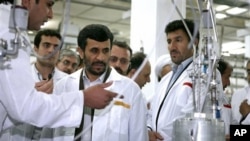Officials say Iran has invited several ambassadors accredited to the International Atomic Energy Agency in Vienna to tour its nuclear facilities later this month.
A diplomat at the IAEA told The Associated Press Monday that Iran's invitation went to Russia, China, the European Union, Arab league members and a group of non-aligned nations. The United States apparently is not among those invited. The news agency quotes U.S. State Department spokesman Mark Toner as saying acts such as Tehran's invitations are not a "substitute for Iran fulfilling its obligations to cooperate with the IAEA."
In a letter dated December 27, senior Iranian envoy Ali Asghar Soltanieh offered an all-expenses paid visit to Iran's nuclear sites on January 15-16. A senior European diplomat in Brussels who declined to be named confirmed the invitations.
Iran and six world powers trying to end the nuclear dispute - the U.S., Russia, China, Britain, France and Germany - are due to hold a second round of talks later this month in Turkey.
The nuclear tour would include Iran's Bushehr nuclear power plant - which begins operations later this month - and the country's uranium enrichment site at Natanz. The diplomats are to meet with Iran's acting foreign minister, Ali Akbar Salehi, who is the head of its atomic agency, and with Tehran's chief nuclear negotiator, Saeed Jalili.
The Bushehr plant, a project completed with Russian help after years of delays, will use a nuclear reactor to generate electricity - the stated goal of the Islamic Republic's entire atomic program. Bushehr is not among the West's main worries because safeguards are in place to ensure that spent fuel is not available for conversion into weapons-grade uranium. After use, the reactor's fuel rods will go to Russia for reprocessing or disposal.
The underground Natanz site, where Iran now runs close to 9,000 centrifuges, is of much deeper international concern.
Western powers want Iran to halt its enrichment program, which they suspect is a cover for an effort to build a nuclear arsenal. Iran says it has the right to enrich uranium for civilian use and asserts that it does not want atomic weapons.
The U.N. Security Council has imposed four sets of sanctions on Iran for its refusal to suspend enrichment. The United States, the European Union and other nations have also imposed economic sanctions that are aimed at the energy sector of the Islamic Republic's economy.
Iran to Open Nuclear Sites to Diplomats, But No Americans Invited

Invitation went to Russia, China, the EU and Arab league members.



